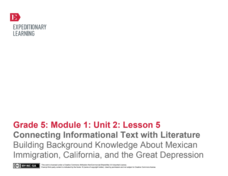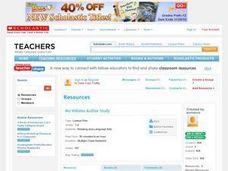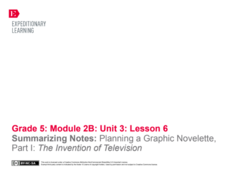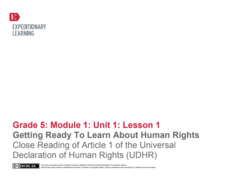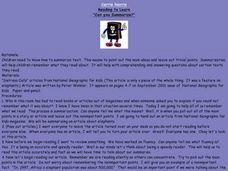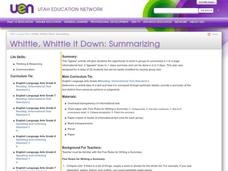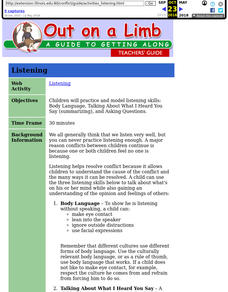EngageNY
Connecting Informational Text with Litearature: Building Background Knowledge About Mexican Immigration, California, and the Great Depression
Help your class transition as the setting in the novel Esperanza Rising, by Pam Muñoz Ryan, moves from Mexico to California. Beginning with prior knowledge, and moving into jigsaw research groups, class members add to and create posters...
Curated OER
Mo Willems Author Study
Who is Mo Willems? Explore the author with your class. Learners read books written by Willems, compare and contrast the characters therein, and make predictions about what will happen. Finish off this author study by having small groups...
Education Center
Safety Sequence
Follow up a class reading of the children's book Officer Buckle and Gloria with this simple sequence-of-events worksheet. Including pictures of six key moments from the story, young learners must first number them in the correct order...
Curated OER
Summing Up
The first verse of A.A. Milne’s poem, Beetle, is the basis for a model of how to summarize a text. The two-page worksheet also includes a short story for guided practice, as well as summarizing questions, a story sharing activity, and an...
EngageNY
End of Unit 2 Assessment: Working with Two Texts - Reading, Listening, Summarizing, and Synthesizing
As a summative assessment for this unit on colonial trade, fourth graders listen to and read informational texts in order to demonstrate their ability to take notes, write summaries, and draw connections. Young scholars first listen as...
EngageNY
Summarizing Notes: Planning a Graphic Novelette Part 1: The Invention of Television
What's the story? Learners create the first of four storyboards about the invention of the television, incorporating narrative techniques and descriptive details. Next, they offer and receive feedback by participating in a peer critique...
EngageNY
Summarizing Bivariate Categorical Data with Relative Frequencies
It is hard to determine whether there is a relationship with the categorical data, because the numbers are so different. Working with a familiar two-way table on super powers, the class determines relative frequencies for each cell and...
Curated OER
Whittle, Whittle it Down: Summarizing
Middle schoolers summarize a one to two page article of informational text. They compose a summary according to the guidelines on the "Five Rules for Writing a Summary" chart. They take turns reading their summary to the group, and...
Curated OER
Guided Reading: Asking Questions
Here is a reading strategies lesson in which learners use post it notes to create a bulletin board. They post their new questions on the bulletin board and look back at questions they have already learned the answer to. A great idea,...
Curated OER
Express Yourself Lesson Seed 3
If you're looking to set your class up for writing effective arguments, try out this idea. While originally created with freedom as a guiding idea, the activity could easily be adapted for other themes. As a class, create a chart of...
Teach Engineering
Determining Densities
Don't be dense—use a robust resource. The second installment of a five-part Floaters and Sinkers unit has learners determine the densities of several objects. As part of the activity, they learn the displacement method for finding...
DiscoverE
Bridges, Buildings and Beyond Activity Packet: Grades 3-5
The road to a better understanding of engineering lies with bridges and tunnels. A set of four engaging activities teaches learners about engineering concepts related to construction projects. They perform an experiment to find the...
Tennessee Technical University
Carousel Brainstorm
A variation of the Walkabout Review process, carousel brainstorming directs groups to rotate through a series of stations posting ideas on the topic or question posted at each stop.
Curated OER
Summary Selections: Activity Menu for Summarizing and Retelling
In this literacy worksheet, students engage in sixteen activities to summarize and retell what they have read. Activities include flip books for the Five Ws, sequencing, somebody wanted but so..., and literary elements. Activities will...
EngageNY
Getting Ready to Learn About Human Rights: Close Reading of Article 1 of the Universal Declaration of Human Rights (UDHR)
Introduce young readers to informational texts with a well-designed, ready-to-use, and Common Core-aligned unit. Young readers learn a variety of skills while studying the Universal Declaration of Human Rights (UDHR). As the first...
EngageNY
Speaking and Listening Skills: Practice
After reviewing their resources from the unit, scholars participate in multiple group discussions with a World Café activity. During the discussions, they share ideas about their focus questions pertaining to Canada's natural resources...
Curated OER
Merging New Technology with Old Stories
Is your city's history a mystery to your class? Ever wonder if your county contains a bounty of folklore? Young computer scientists incorporate technology with time-honored tales during a project with both individual and group...
Florida Center for Reading Research
Comprehension: Monitoring for Understanding, What Do You Know?
An activity promotes reading comprehension. Readers analyze a text of their choice while activating prior knowledge and asking and answering questions. Scholars enforce multiple strategies to improve comprehension.
Big Kid Science
Eclipse Classroom Activities: Cultural Significance Project
What better way to celebrate eclipses than across cultures? Explore myths of solar and lunar eclipses from ancient cultures like the Chinese, Ancient Greek, Mesoamerican, Incan, Egyptian, Ancient Babylonian, and Middle Eastern. Learners...
Serendip
How Do Biological Organisms Use Energy?
When an organism eats, how does food become energy? Young biologists follow glucose through the process of cellular respiration to the creation of ADP using a discussion-based activity. The resource also highlights conservation of mass...
DocsTeach
Two Versions of FDR's Infamy Speech
Historians follow FDR's Infamy speech from rough draft to the official address to the Senate. An intriguing activity compares and contrasts FDR's original speech to the official version. Academics also listen to FDR address the Senate....
Curated OER
Can you Summarize?
Learners write summaries of non-fiction articles in this lesson. They read the article silently and then pick out the main points. Students list the main events as a whole class activity, and then they individually write a summary of...
Curated OER
Whittle, Whittle it Down: Summarizing
Sixth graders are introduced to the jigsaw method of summarizing text. In groups, they create their own summary and work together as a class to create just one class summary. To end the activity, they read the class summary and review...
Curated OER
A Guide to Getting Along: Listening
Here is an effective way to have your charges practice and model important listening skills. After a short review of effective active listening concepts, such as using body language, summarizing what the other person said, and asking...


